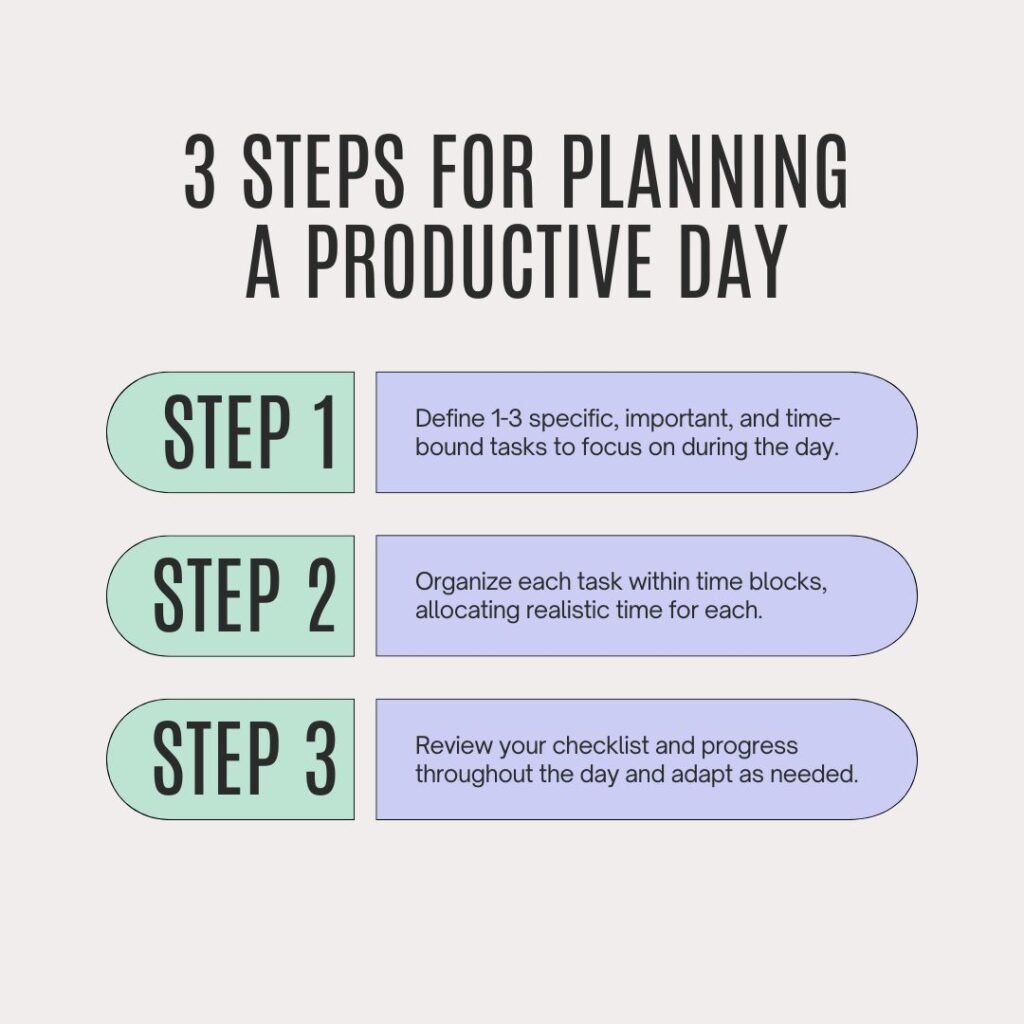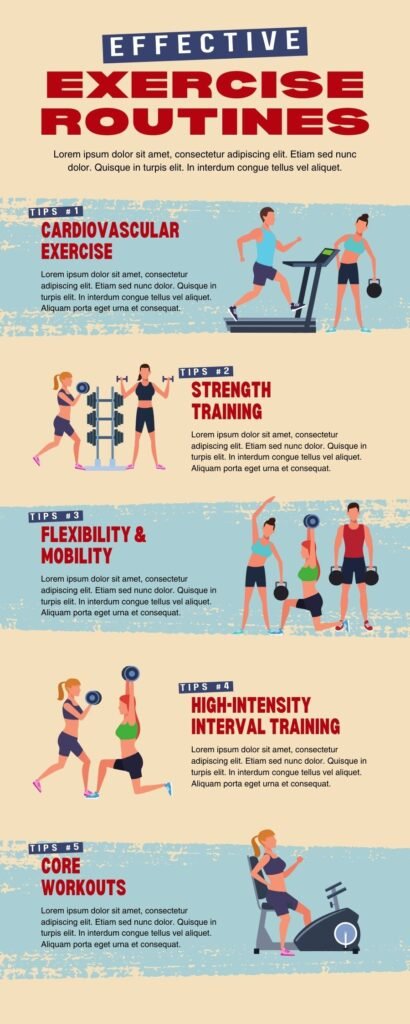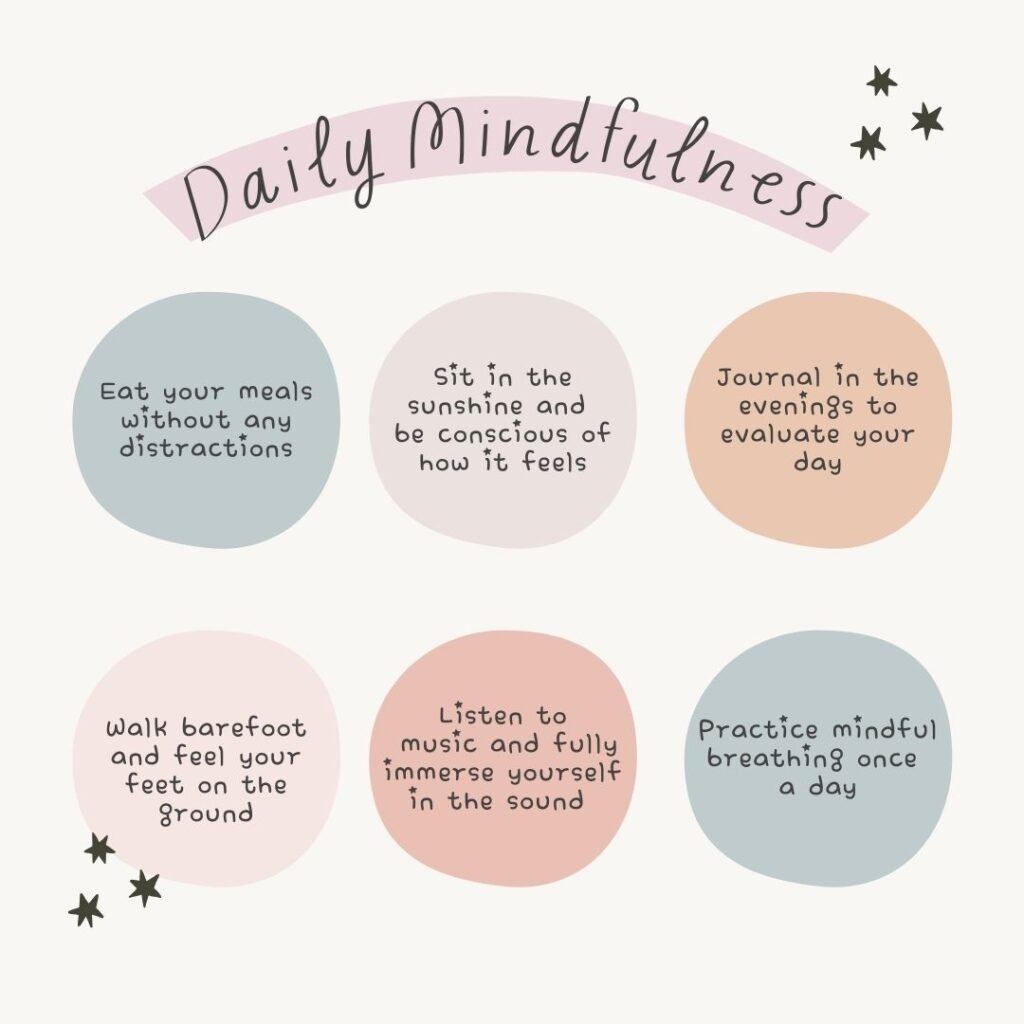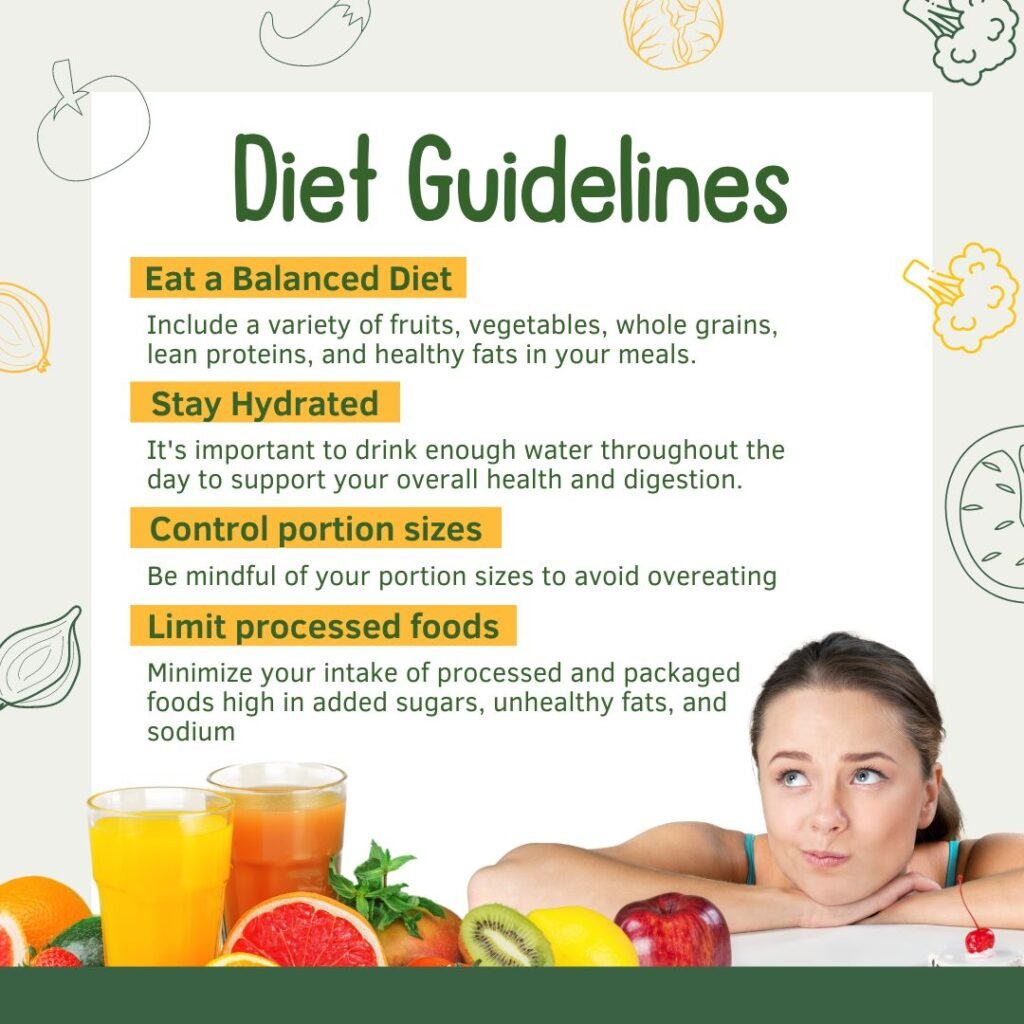Weight-Loss
Balanced Diet

A balanced diet is crucial for achieving healthy and sustainable weight loss. It involves consuming a variety of foods that provide essential nutrients while controlling calorie intake. Here’s how you can structure your diet to support your weight loss goals:
1. Include a Variety of Foods: A balanced diet includes a wide range of foods from all food groups: fruits, vegetables, whole grains, lean proteins (like chicken, fish, tofu), and healthy fats (found in nuts, seeds, and olive oil). Each food group offers unique vitamins, minerals, and antioxidants that support overall health and aid in weight management.
2. Portion Control: Pay attention to portion sizes to avoid overeating, even of healthy foods. Use smaller plates, bowls, and utensils to help control portion sizes visually. Aim to fill half of your plate with fruits and vegetables, a quarter with lean protein, and a quarter with whole grains or starchy vegetables like sweet potatoes.
3. Monitor Caloric Intake: While focusing on nutrient-dense foods, be mindful of your overall calorie intake. Consuming more calories than your body needs, even from healthy foods, can hinder weight loss efforts. Use tools like food journals or calorie-tracking apps to monitor your intake and ensure you’re in a calorie deficit to promote weight loss.
4. Limit Processed Foods and Sugary Drinks: Processed foods and sugary beverages often contain added sugars, unhealthy fats, and extra calories that can sabotage your weight loss efforts. Opt for whole, unprocessed foods whenever possible and choose water or herbal tea over sugary drinks to stay hydrated without extra calories.
5. Hydration: Drinking an adequate amount of water is essential for overall health and can support weight loss. Water helps boost metabolism, flushes out toxins, and aids in digestion. Aim to drink at least 8 glasses (about 2 liters) of water per day, adjusting based on your activity level and climate.
6. Plan and Prepare Meals Ahead: Planning and preparing meals ahead of time can help you make healthier choices and avoid impulse eating of less nutritious foods. Plan your meals and snacks for the week, shop for ingredients, and prep ingredients in advance to save time during busy days.
7. Balance and Moderation: A balanced diet isn’t about strict rules or deprivation but rather about finding a sustainable approach to eating that you can maintain long-term. Allow yourself occasional treats in moderation to satisfy cravings and prevent feelings of deprivation, which can lead to overeating.
Portion Control
Portion control plays a critical role in managing weight effectively. It involves managing the amount of food you eat to ensure you’re not consuming more calories than your body needs. Here are practical tips to help you practice portion control for successful weight loss:
1. Use Smaller Plates and Bowls: Opt for smaller plates and bowls to visually trick your brain into thinking you’re eating more than you actually are. This can help prevent overeating without feeling deprived.
2. Measure Serving Sizes: Use measuring cups, spoons, or a food scale to accurately measure portions, especially for foods like grains, cereals, and snacks. This ensures you’re aware of how much you’re eating and helps prevent portion distortion.
3. Follow the Plate Method: Divide your plate into sections: fill half with non-starchy vegetables (like leafy greens or broccoli), a quarter with lean protein (such as chicken, fish, or tofu), and a quarter with whole grains or starchy vegetables (like brown rice or sweet potatoes). This balanced approach naturally controls portion sizes while ensuring a variety of nutrients.
4. Be Mindful of Snacks: Portion out snacks into small bowls or containers instead of eating directly from the package. This helps prevent mindless munching and allows you to enjoy your snack without overindulging.
5. Learn Visual Cues: Familiarize yourself with visual cues for portion sizes. For example, a serving of meat should be about the size of a deck of cards, a serving of pasta should fit in your cupped hand, and a serving of cheese should be about the size of your thumb.
6. Listen to Hunger Cues: Pay attention to your body’s hunger and fullness signals. Eat slowly and savor each bite, giving your brain time to register when you’re satisfied rather than stuffed.
7. Avoid Eating Straight from Packages: Eating directly from bags or containers makes it easy to lose track of how much you’ve consumed. Instead, portion out snacks into a small dish or bowl to control intake.
8. Practice Mindful Eating: Focus on your meal or snack without distractions like TV or phones. Mindful eating helps you appreciate flavors, recognize fullness, and avoid overeating.

Regular Exercise
Regular exercise is essential for achieving and maintaining weight loss in a healthy and sustainable way. It not only helps burn calories but also improves overall fitness and boosts metabolism. Here’s how you can incorporate regular exercise into your weight loss journey:
1. Types of Exercise: Incorporate a mix of aerobic exercises (like walking, jogging, swimming) and strength training (using weights or resistance bands). Aerobic exercises help burn calories and improve cardiovascular health, while strength training builds muscle, which can boost metabolism.
2. Frequency and Duration: Aim for at least 150 minutes of moderate-intensity aerobic exercise per week, spread out over several days. Alternatively, aim for 75 minutes of vigorous-intensity aerobic exercise per week. Additionally, include strength training exercises at least two days per week, targeting all major muscle groups.
3. Start Gradually: If you’re new to exercise or haven’t been active for a while, start slowly and gradually increase intensity and duration over time. This approach reduces the risk of injury and helps build stamina and endurance.
4. Set Realistic Goals: Set specific, achievable exercise goals to keep yourself motivated and track progress. Whether it’s increasing your daily steps, improving your running distance, or lifting heavier weights, setting goals helps maintain focus and commitment.
5. Mix It Up: Keep your exercise routine interesting and challenging by varying activities. Try different fitness classes, outdoor activities, or sports to prevent boredom and work different muscle groups.
6. Stay Active Throughout the Day: In addition to structured exercise sessions, find ways to stay active throughout the day. Take the stairs instead of the elevator, walk or bike for short trips, and incorporate movement breaks during sedentary periods.
7. Listen to Your Body: Pay attention to how your body feels during and after exercise. If you experience pain or discomfort, adjust your exercise routine or consult a fitness professional for guidance.
8. Stay Hydrated and Fuel Your Body: Drink plenty of water before, during, and after exercise to stay hydrated. Fuel your body with nutritious foods, including carbohydrates for energy and protein for muscle repair and growth.

Hydration
Hydration is a crucial factor in any weight loss journey, often overlooked but vital for overall health and proper body function. Here’s why staying adequately hydrated is essential and how you can ensure you’re getting enough fluids:
1. Importance of Hydration: Drinking enough water is essential for maintaining bodily functions such as temperature regulation, digestion, nutrient absorption, and the removal of waste products. Hydration also supports metabolism, which can aid in weight loss.
2. How Much Water to Drink: While individual needs vary, a general guideline is to aim for about 8 glasses of water per day, which equals about 2 liters or half a gallon. However, factors such as activity level, climate, and overall health can affect your hydration needs.
3. Signs of Dehydration: Recognizing signs of dehydration is crucial. Symptoms may include thirst, dry mouth, dark urine, headache, fatigue, and dizziness. If you experience these symptoms, increase your fluid intake promptly.
4. Benefits for Weight Loss: Drinking water before meals can help reduce appetite and calorie intake, promoting weight loss. Water also has zero calories, making it an excellent alternative to sugary beverages that contribute to weight gain.
5. Tips for Staying Hydrated:
- Carry a reusable water bottle with you throughout the day as a reminder to drink water regularly.
- Flavor water with a slice of lemon, cucumber, or mint for added taste without extra calories.
- Drink water before, during, and after exercise to stay hydrated and support performance.
6. Monitor Hydration Status: Pay attention to your urine color; clear or pale yellow urine generally indicates adequate hydration. Dark yellow or amber-colored urine may indicate dehydration.
7. Hydration from Foods: In addition to drinking water, you can also hydrate through certain foods that have high water content, such as fruits (like watermelon and oranges) and vegetables (like cucumber and lettuce).
8. Caffeine and Alcohol Considerations: Caffeinated beverages like coffee and tea can contribute to your daily fluid intake, but excessive consumption may have diuretic effects. Alcohol can also dehydrate you, so drink water alongside alcoholic beverages.
Sleep Quality
Sleep quality plays a significant role in weight loss and overall well-being. Getting enough high-quality sleep is essential for various physiological processes, including metabolism, hormone regulation, and appetite control. Here’s why sleep is crucial for weight loss and tips to improve sleep quality:
1. Importance of Sleep for Weight Loss: Quality sleep is crucial for weight management because it affects hormones that regulate hunger (ghrelin) and fullness (leptin). Poor sleep can disrupt these hormones, leading to increased appetite and cravings for unhealthy foods.
2. Recommended Sleep Duration: Aim for 7-9 hours of sleep per night, as recommended by health experts. Individual needs may vary, but consistently getting enough sleep supports overall health and helps maintain a healthy weight.
3. Establish a Sleep Routine: Create a consistent sleep schedule by going to bed and waking up at the same time each day, even on weekends. This routine helps regulate your body’s internal clock and improves sleep quality over time.
4. Create a Relaxing Sleep Environment: Make your bedroom conducive to sleep by keeping it cool, dark, and quiet. Use blackout curtains, earplugs, or a white noise machine if needed. Consider investing in a comfortable mattress and pillows that support restful sleep.
5. Limit Screen Time Before Bed: Reduce exposure to screens (phones, tablets, computers, TVs) at least an hour before bedtime. The blue light emitted from screens can disrupt your body’s production of melatonin, a hormone that regulates sleep-wake cycles.
6. Practice Relaxation Techniques: Wind down before bed with relaxation techniques such as deep breathing, meditation, or gentle yoga. These activities can help reduce stress and prepare your mind and body for sleep.
7. Avoid Stimulants and Heavy Meals: Avoid consuming caffeine and large meals close to bedtime, as they can interfere with your ability to fall asleep and reduce sleep quality.
8. Manage Stress and Anxiety: Address stress and anxiety through techniques like journaling, talking to a friend or therapist, or engaging in hobbies that promote relaxation. Stress management contributes to better sleep quality.

Mindful Eating
Mindful eating is a practice that promotes awareness of your eating habits and helps you develop a healthier relationship with food. It involves paying full attention to the experience of eating and drinking, both internally and externally. Here’s how mindful eating can support your weight loss journey and tips to incorporate it into your daily routine:
1. Slow Down and savor each bite: Eating slowly allows you to fully experience the flavors and textures of your food, as well as recognize feelings of hunger and satisfaction.
2. Pay Attention to Hunger and Fullness Cues: Tune in to your body’s signals of hunger and fullness. Eat when you’re moderately hungry and stop when you’re comfortably satisfied, not overly full.
3. Eliminate Distractions: Minimize distractions during meals by turning off screens, putting away phones, and focusing solely on the act of eating. This helps prevent overeating and promotes mindful enjoyment of food.
4. Engage Your Senses: Notice the colors, smells, and textures of your food. Take time to appreciate the appearance and aroma of your meal before taking a bite.
5. Practice Gratitude: Cultivate gratitude for the food you’re eating and the nourishment it provides to your body. This mindset shift can enhance your eating experience and promote healthier choices.
6. Chew Thoroughly: Chew your food thoroughly and savor each bite. This aids digestion and allows your brain to register signals of fullness more accurately.
7. Recognize Emotional Eating Triggers: Be mindful of emotional triggers that may lead to unhealthy eating habits. Instead of turning to food for comfort, find alternative ways to cope with emotions, such as journaling or talking to a friend.
8. Choose Nutrient-Dense Foods: Prioritize nutrient-dense foods that provide essential vitamins, minerals, and antioxidants. These foods support overall health and well-being while satisfying hunger more effectively.

Set Realistic Goals
Setting realistic goals is crucial for successful weight loss and long-term maintenance. It involves establishing achievable objectives that motivate you and keep you on track without setting yourself up for disappointment. Here’s how to set effective goals and why they are important in your weight loss journey:
1. Specific Goals: Define your goals clearly and specifically. Instead of saying, “I want to lose weight,” specify how much weight you want to lose and in what timeframe, such as losing 1-2 pounds per week.
2. Measurable Progress: Set goals that you can measure to track your progress. Use metrics like pounds lost, inches lost around your waist, or improvements in fitness levels to monitor your achievements.
3. Achievable Objectives: Ensure your goals are realistic and attainable based on your current lifestyle, commitments, and health status. Setting overly ambitious goals can lead to frustration and setbacks.
4. Relevant to Your Lifestyle: Align your goals with your lifestyle and preferences. Choose activities and dietary changes that fit into your daily routine and are sustainable for the long term.
5. Time-Bound Goals: Give yourself a deadline or timeframe to achieve each goal. This helps create urgency and accountability, motivating you to stay focused and committed.
6. Break Down Larger Goals: If you have a significant amount of weight to lose, break your larger goal into smaller, manageable milestones. Celebrate each milestone as you progress toward your ultimate goal.
7. Flexibility and Adaptability: Remain flexible and willing to adjust your goals as needed. Life circumstances may change, and your goals should be adaptable to accommodate setbacks or unexpected challenges.
8. Importance of Motivation and Accountability: Stay motivated by reminding yourself of the reasons behind your goals, whether it’s improved health, increased energy, or enhanced confidence. Seek support from friends, family, or a support group to stay accountable.

Seek Support
Seeking support is a valuable strategy in achieving successful and sustainable weight loss. It involves reaching out to others for encouragement, guidance, and accountability throughout your journey. Here’s why seeking support is important and how you can effectively incorporate it into your weight loss efforts:
1. Importance of Support: Having support from friends, family, or a support group can provide motivation, encouragement, and practical advice when facing challenges on your weight loss journey. It can also help you stay accountable to your goals.
2. Types of Support:
- Emotional Support: Encouragement, empathy, and understanding from loved ones or a support group can boost your morale and motivation.
- Practical Support: Help with meal planning, exercise routines, or childcare can make it easier to prioritize your health goals.
- Informational Support: Guidance from healthcare professionals, dietitians, or fitness trainers can provide evidence-based strategies tailored to your needs.
3. Find Your Support System: Identify individuals or groups who can provide the specific type of support you need. This could include joining online communities, attending local weight loss groups, or enlisting the help of a workout buddy.
4. Communicate Your Needs: Clearly communicate your goals and expectations to your support network. Let them know how they can best support you, whether it’s through daily check-ins, joining you in workouts, or providing healthy recipe ideas.
5. Stay Accountable: Regularly update your support system on your progress and challenges. Sharing your successes and setbacks can help keep you accountable and motivated to stay on track.
6. Celebrate Milestones Together: Celebrate milestones and achievements with your support system. Whether it’s losing a certain amount of weight, completing a fitness challenge, or reaching a health goal, celebrating together reinforces your progress and boosts morale.
7. Professional Support: Consider seeking professional support from a registered dietitian, personal trainer, or therapist specializing in behavior change. They can provide expert advice, personalized plans, and additional motivation to help you achieve your weight loss goals.

Manage Stress
Managing stress is crucial for successful weight loss and overall well-being. Stress can lead to emotional eating, poor food choices, and hormonal imbalances that hinder weight loss progress. Here are effective strategies to manage stress and support your weight loss journey:
1. Understand Stress and its Impact: Stress triggers the release of cortisol, a hormone that can increase appetite and cravings for unhealthy foods. Chronic stress can also disrupt sleep patterns and hinder your ability to make healthy lifestyle choices.
2. Identify Your Stressors: Identify sources of stress in your life, whether they are related to work, relationships, finances, or health. Awareness of your stressors is the first step in managing them effectively.
3. Practice Stress-Relief Techniques:
- Deep Breathing: Practice deep breathing exercises to calm your mind and body. Slowly inhale through your nose, hold for a few seconds, and exhale through your mouth.
- Mindfulness and Meditation: Engage in mindfulness practices or meditation to reduce stress and increase self-awareness. Focus on the present moment and observe your thoughts and emotions without judgment.
- Physical Activity: Regular exercise, such as yoga, walking, or swimming, can help reduce stress levels and improve mood through the release of endorphins, the body’s natural mood elevators.
4. Prioritize Self-Care: Make time for activities that bring you joy and relaxation, whether it’s reading, spending time in nature, or pursuing a hobby. Taking care of your emotional and mental well-being is essential for managing stress effectively.
5. Establish Healthy Boundaries: Set boundaries to protect your time and energy. Learn to say no to commitments or tasks that add unnecessary stress to your life and prioritize activities that promote your well-being.
6. Seek Social Support: Connect with friends, family, or a support group for emotional support and encouragement. Talking to others can provide perspective, reduce feelings of isolation, and offer practical advice for managing stress.
7. Maintain a Healthy Lifestyle: Eat a balanced diet, prioritize regular physical activity, and get enough sleep to support your body in coping with stress effectively. These healthy habits contribute to overall well-being and resilience against stress.
8. Professional Help: If stress becomes overwhelming or persistent, consider seeking professional help from a therapist or counselor who specializes in stress management techniques. They can provide personalized strategies and support.

Consistency and Patience
Consistency and patience are fundamental principles for achieving sustainable weight loss and maintaining overall health. These qualities help you stay committed to your goals over time, navigate challenges, and celebrate progress, no matter how small. Here’s why consistency and patience matter and how to cultivate them on your weight loss journey:
1. Importance of Consistency: Consistency involves making healthy choices day in and day out, even when faced with obstacles or setbacks. It builds habits that contribute to long-term success rather than short-term fixes.
2. Establishing Healthy Habits: Consistency allows you to establish and maintain healthy habits such as regular exercise, balanced nutrition, adequate hydration, and quality sleep. These habits form the foundation of sustainable weight loss and overall well-being.
3. Tracking Progress: Regularly track your progress to stay motivated and accountable. Use tools like a journal, app, or fitness tracker to monitor changes in weight, body measurements, fitness levels, and dietary habits.
4. Overcoming Setbacks: Accept that setbacks are a natural part of any journey. Instead of getting discouraged, use setbacks as learning opportunities. Identify triggers, adjust your approach if needed, and refocus on your long-term goals.
5. Practicing Patience: Patience is key to sustainable weight loss. Understand that healthy changes take time to yield noticeable results. Avoid drastic measures or quick-fix solutions that promise rapid weight loss but are difficult to maintain.
6. Celebrating Small Victories: Acknowledge and celebrate small achievements along the way, such as consistently choosing nutritious meals, completing a challenging workout, or improving your endurance. Celebrating milestones boosts morale and reinforces positive behaviors.
7. Building Resilience: Cultivate resilience by staying adaptable and committed to your goals, even during times of stress or temptation. Learn from setbacks, stay focused on your long-term vision, and continue making progress.
8. Support and Accountability: Lean on your support system for encouragement and accountability. Share your goals with friends, family, or a support group who can cheer you on, offer guidance, and celebrate your achievements with you.


